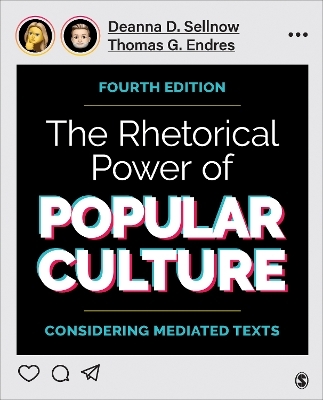
The Rhetorical Power of Popular Culture
SAGE Publications Inc (Verlag)
978-1-0718-5154-8 (ISBN)
The Fourth Edition of The Rhetorical Power of Popular Culture offers students a step-by-step introduction to rhetorical theory and criticism by focusing on the powerful role popular culture plays in persuading us as to what to believe and how to behave. In every chapter, students are introduced to rhetorical theories, presented with current examples from popular culture that relate to the theory, and guided through demonstrations about how to describe, interpret, and evaluate popular culture texts through rhetorical analysis. Authors Deanna Sellnow and Thomas Endres provide sample student essays in every chapter to demonstrate rhetorical criticism in practice. This edition’s easy-to-understand approach and range of popular culture examples help students apply rhetorical theory and criticism to their own lives and assigned work.
Deanna D. Sellnow is a professor of strategic communication in the Nicholson School of Communication and Media at the University of Central Florida. She conducts research in two major areas. The first focuses on strategic instructional communication in a variety of contexts including both in-person and online classrooms, as well as risk, crisis, and health communication contexts. The second focuses on rhetorical studies of popular culture (ranging from music to advertisements to television programs and feature films). She has conducted funded research for the World Health Organization (WHO), the U.S. Geological Survey (USGS), the U.S. Department of Agriculture (USDA), the U.S. Department of Homeland Security (DHS), the National Oceanic and Atmospheric Administration (NOAA), and the U.S. Centers for Disease Control and Prevention (CDC). Her work is published in refereed national and international journals, as well as several books. She has presented her work across the United States and in many countries around the world, including Canada, China, Denmark, Egypt, England, Germany, Hong Kong, India, Indonesia, Ireland, Italy, Japan, Senegal, Singapore, Spain, Sweden, Türkiye, and Vietnam. She and her husband, Tim, have a daughter (Debbie) and son-in-law (Scott), son (Rick) and daughter-in-law (Sarah), and three grandchildren (Lincoln, Emmett, and Rosemary). Thomas G. Endres is a professor of Communication Studies at the University of Northern Colorado, where he serves as coordinator to the Leadership Studies (LEAD) minor and to the Extended Campus online degree completion program. In a career marked primarily by administrative (chair or director) responsibilities, he found time to conduct research in the areas of pedagogy, popular culture, and rhetoric. He has published several dozen refereed articles, book chapters, conference proceedings, and an encyclopedia entry, applying Bormann’s Symbolic Convergence Theory to the study of rhetorical communities; examining such diverse collectives as single mothers, father-daughter dyads, laity in the Catholic church, and tattooed people. He is author and photographer of two books: Sturgis Stories: Celebrating the People of the World’s Largest Motorcycle Rally and, most recently, My Costume, Myself: Celebrating Stories of Cosplay and Beyond. He has delivered more than 250 presentations, workshops, and keynote addresses across the United States and in countries such as Austria, China, the Czech Republic, Japan, Spain, Thailand, Turkey, and the United Kingdom. Tom has four children (three daughters, one son) and, at the time of writing, two grandchildren. He lives in Greeley, CO, with his wife Maki Notohara Endres.
Chapter 1. What Is Popular Culture and Why Study It?
Chapter 2. Expanding the Rhetorical Tradition
Chapter 3. A Narrative Perspective
Chapter 4. A Dramatistic Perspective
Chapter 5. A Symbolic Convergence Perspective
Chapter 6. A Neo-Marxist Perspective
Chapter 7. Feminist Perspectives
Chapter 8. A Music Perspective: The Illusion of Life
Chapter 9. Visual Perspectives
Chapter 10. Media-Centered Perspectives
Appendix. Writing a Popular Culture Rhetorical Essay
| Erscheinungsdatum | 16.05.2024 |
|---|---|
| Verlagsort | Thousand Oaks |
| Sprache | englisch |
| Maße | 187 x 231 mm |
| Gewicht | 600 g |
| Themenwelt | Geisteswissenschaften ► Philosophie ► Erkenntnistheorie / Wissenschaftstheorie |
| Geisteswissenschaften ► Sprach- / Literaturwissenschaft ► Sprachwissenschaft | |
| Sozialwissenschaften ► Kommunikation / Medien ► Kommunikationswissenschaft | |
| ISBN-10 | 1-0718-5154-3 / 1071851543 |
| ISBN-13 | 978-1-0718-5154-8 / 9781071851548 |
| Zustand | Neuware |
| Haben Sie eine Frage zum Produkt? |
aus dem Bereich


![Was heißt Denken?. Vorlesung Wintersemester 1951/52. [Was bedeutet das alles?] - Martin Heidegger](/media/113619842)